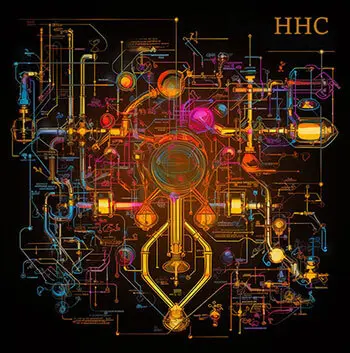Cannabis and Neurodegenerative Diseases
| INDEX | |
|---|---|
| Index Article "Cannabis and Neurodegenerative Diseases" | |
Introduction
In 2021 they released a review of a cannabis study called “Medicinal Cannabis and Central Nervous System Disorders” from Frontiers in Pharmacology.
This study the great therapeutic potential of cannabinoids is addressed, presenting medicinal cannabis as an option for various neurological and central nervous system (CNS) conditions. The study focuses on clinical trials supporting the effectiveness of tetrahydrocannabinol and cannabidiol in contrast to the whole plant.
If you want to know the Nervous System before proceeding with this article you can consult the following link: Art: Cannabis and the Nervous System
The following paragraphs will address how clinical research has focused on how cannabis affects diseases related to the Central Nervous System; neurodegeneration and neurological disorders.
Stay with us to find out what the study consisted of! If you want to read the full study, here are the links. Enjoy it!
Neurodegenerative and Neurological Diseases
It is known from recent studies that deaths from diseases of this type have increased by 35%, globally, in the last 25 years. These diseases usually affect middle-aged and elderly people.
The diseases addressed in the study are: Alzheimer's, Parkinson's, Huntington's, Multiple Sclerosis, Amyotrophic Lateral Sclerosis and Epilepsy.
1.
ALZHEIMER (AD)
Alzheimer's is a chronic neurodegenerative disease that affects the brain, especially in the areas that are related to memory. and cognitive functions. It could be said that it is the most common form of dementia.
In this disease, an abnormal accumulation of proteins occurs, such as β-amyloid plaques and neurofibrial tangles, that damage and kill nerve cells, resulting in progressive loss of memory and other mental functions.
The symptoms of this disease are: memory loss, confusion, changes in behavior, disorientation in time and space, and inability to perform daily tasks.
As an introduction to the study, we can say that the journey of how cannabinoids can help Illness Alzheimer's (AD) is complex. There are some who say that certain receptors decrease while others say that no significant changes occur. The key role of serotonin also appears, a substance found in the brain and which, it seems, could be key in Alzheimer's.
Emphasizing the two major cannabinoids, CBD and THC, everything becomes even more interesting. It seems that CBD has the superpower to improve memory and can help you deal with some problematic substances in the brain related to Alzheimer's. On the other hand, THC is a hero in helping us protect brain cells and reduce the accumulation of bad things in the brain.
Comparison Table between CBD and THC:

Conclusion of how Cannabis affects Alzheimer's:
The research concludes that cannabinoids in Alzheimer's (AD) present a complex and promising panorama. Schematically it could be summarized as:
There are discrepancies in the expression of cannabinoid receptors, especially CB1R and CB2R. This is because some studies report decreases in CB1R postmortem and others find no significant changes.
The application of the serotonergic system, especially the 5-HT1A receptors, adds an additional layer to the understanding of Alzheimer's (AD) with different very promising research on receptor agonists and antagonists to improve cognitive function.
CBD modulates beta-amyloid activation and restores cognitive function.
THC exhibits neuroprotective effects in transgenic mouse models.
Today there is no cure for Alzheimer's, but there are treatments that can help manage the symptoms and improve the quality of life of affected people.
2.
PARKINSON (EP)
Parkinson's (PD) is a chronic neurodegenerative disease that mainly affects the central nervous system, affecting function motor and cognitive, that is, to movement and memory. This is due to the loss of neurons called dopaminergic. Dopamine is a neurotransmitter crucial for coordination and movement.
The symptoms of Parkinson's are: tremors at rest, bradykinesia (slow movements), muscle rigidity and difficulties in balance and coordination. In addition to these effects, some people suffer from cognitive problems, mood disturbances, and sleep disorders.
After research, it was found that within our brain there are a kind of “switches” called Cannabinoid Receptors and what they produce changes in a substance called serotonin.
Studies suggest that CBD, cannabidiol could help protect our neurons and improve symptoms such as tremors and memory problems. On the other hand, THC seems to have positive effects on movement and brain protection span>.
Comparison Table between CBD and THC:

Conclusion on how Cannabis affects Parkinson's (PD):
The research indicates changes in the expression of cannabinoid receptors (CB1R and CB2R) and in serotonergic signaling span> in patients with Parkinson's (PD).
CB1R expression decreases and CB2R increases with the accumulation of β-amyloid plaques. The progression of these receptors could be related to the progression of the disease. Additionally, serotonergic systems are affected, associating with dopamine and serotonin.
CBD shows great potential as a neuroprotectant and as an improvement in psychotic symptoms, tremors and motor function.
THC stands out for helping to improve locomotor activity and reducing dopaminergic loss.
Today there is no cure for Alzheimer's, but there are treatments that can help manage the symptoms and improve the quality of life of affected people. These treatments typically include medications to increase dopamine levels in the brain and physical and occupational therapies to address motor challenges and improve daily functionality.
3.
HUNTINGTON (EH)
Huntington's disease (HD) is a hereditary and degenerative brain disorder that affects the entire body and mind. It is due to abnormal genetic mutation that results in the production of an abnormal form of a protein called huntingtin.
The symptoms of this disease can occur in adulthood and are the following: involuntary movements, coordination problems, swallowing difficulties and changes in personality, state mood and cognitive function.
This study states that research has found changes in cannabinoid receptors (CB1 and CB2) and in the serotonergic system, related to mood. In the early stages of Huntington's disease (HD), a decrease in CB1 mRNA is seen in key brain areas, but it has been found that some substances increase endocannabinoid activity, can improve motor function. On the other hand, CB2 increases. Especially between astrocytes and microglia, and an alteration of the serotonergic system is evident.
In preclinical models, THC has been observed to have neuroprotective effects. Which suggests having great therapeutic potential. On the other hand, CBD has been shown to reverse neurodegeneration, most likely due to its antioxidant capabilities.
However, trials do not seem to have yet found significant benefits with nabiximols, CBD or nabilone, to combat problems in motor function and cognition, in patients with Huntington's. More research is needed to fully address this issue.
Below is a comparative table highlighting key findings on the impact of THC and CBD on Huntington's Disease:

Conclusion on how Cannabis affects Huntington's (HD):
THC has been shown to have certain protective effects on brain cells.
CBD appears to have antioxidant properties.
Although THC and CBD have been shown to have positive effects on people suffering from HD, the results are very complicated. Although there are promising signs that cannabis could help treat this disease, more research is still needed.
To date, this disease has no cure and treatment focuses on relieving symptoms and improving the patient's quality of life. It is a complicated condition that affects each person differently. It is advisable to go to the doctor if it is known that we have a family history.
4.
MULTIPLE SCLEROSIS (MS)
Multiple Sclerosis is a chronic and autoimmune disease that affects the Central Nervous System. It is because the immune system, which normally protects the body against diseases, mistakenly attacks myelin, a substance that covers and protects nerve fibers in the CNS.
When myelin is destroyed, it leaves scars called sclerosis, and these affected areas can interrupt the transmission of nerve signals, giving rise to a multitude of symptoms that vary depending on their location and severity.
The symptoms of MS are: fatigue, difficulties in coordination and balance, muscle weakness, vision problems, altered sensitivity and cognitive difficulties.
This study explains that this disease mainly affects young adults and is characterized by inflammation and neuronal loss in the CNS. It is concluded in the essay that the Cannabinoid Receptors (CB1 and CB2) play a fundamental and essential role in the regulation of the disease.
In preclinical studies, a decrease in CB1R has been observed in Multiple Sclerosis. This expression of CB1R and CB2R is increased in affected areas in MS patients. Furthermore, reductions in serotonin transporters have been associated with psychiatric symptoms in MS.
CBD has been shown, in research, to help improve symptoms and reduce inflammation.</span
Nabiximols, a combination of THC and CBD, has proven effective in relieving spasticity without impairing cognitive function, unlike THC alone, which raises concerns about long-term cognitive health.
At the end of the study, the need for more studies to address the issue is emphasized.
Below is a Comparative Table of how CBD and THC affect Multiple Sclerosis. It must be taken into account that these data may vary depending on the dose, the method of administration and other factors.

Conclusion on how Cannabis affects Multiple Sclerosis (MS):
CBD offers benefits for multiple sclerosis by improving symptoms and reducing inflammation.
The combination of CBD with THC relieves spasticity and, furthermore, does not show cognitive impairment.
THC raises concerns about long-term cognitive health.
More studies are needed to optimize the use of cannabinoids in the treatment of MS.
To date, Multiple Sclerosis has no cure, but there are treatments that help control the symptoms and delay the progression of the disease. It is important to emphasize that this disease can vary significantly from one person to another.
5.
AMYOTROPHIC LATERAL SCLEROSIS (ALS)
Amyotrophic Lateral Sclerosis is a progressive neurodegenerative disease that affects nerve cells in the brain and spinal cord, known as motor neurons.
These neurons are responsible for transmitting messages from the brain to the voluntary muscles of the body, allowing movement.
When these motor neurons degenerate and die, it leads to a progressive loss of the ability to control the muscles. That is why they end up atrophying and leading to problems with mobility, loss of motor skills and, ultimately, it can affect essential functions such as the ability to breathe.
The most characteristic symptoms of this disease are: muscle weakness, spasms and difficulty speaking, swallowing and breathing. As for cognitive function, it usually remains intact. However, there is evidence of a percentage of patients who experience changes in thinking and decision-making.
The study concludes that research shows that receptors (CB1R and CB2R) can play a complex role in ALS. Some studies claim a neuroprotective action and others indicate continued decline in neuronal health.
The motor neurons affected in ALS are connected to serotonergic neurons, which could contribute to the spasticity observed in the disease.
THC has been shown to delay the progression of the disease and increase survival, most likely, thanks to the neuroprotective effects that reduce oxidative stress and excitotoxicity in the bone marrow. spinal. To date, human studies are limited, but there are indications that cannabinoids, such as nabiximols (CBD + THC) may help relieve symptoms of spasticity in ALS.
Below is a Comparative Table of how CBD and THC affect Amyotrophic Lateral Sclerosis (ALS):

Conclusion on how Cannabis affects Multiple Sclerosis (MS):
THC has shown potential beneficial effects in ALS disease.
Research on CBD is less conclusive, although it is suggested that it may alleviate the disease.
There are indications that cannabinoids, such as nabiximols (CBD + THC) may help relieve the symptoms of spasticity.
More studies are needed to understand how cannabinoids act in ALS.
Currently, there is no cure for ALS and existing treatments focus on relieving symptoms and improving the patient's quality of life. Unfortunately, it is a very harsh and debilitating disease that leads to progressive disability over time. To this day, how to combat it continues to be studied.
6.
EPILEPSY
Epilepsy is a neurological disorder that affects the CNS and causes abnormal brain activity, which leads to various episodes called “seizures” or “convulsions.”
When seizures occur, there is a discharge of abnormal electrical signals in the brain, which can affect behavior, consciousness or motor function.
Seizures, as well as their frequency and severity, can be different depending on the person. The most common symptoms are: involuntary movements, loss of consciousness, changes in perception and unusual sensations.
Epilepsy can be caused by various conditions: brain injuries, genetic disorders, brain infections or problems during fetal development.
In the study mentioned in this article, it has been shown that cannabinoid compounds have antispastic properties in neurodegenerative diseases, supporting their use in the treatment of epileptic seizures.
THC has been shown to eliminate seizures by stimulating CB1 receptors.
CBD acts through other pathways, including its interaction with 5-HT receptors and sodium ion channels, showing protective effects in epilepsy models.
Studies with Epidiolex, a clinically approved medication, have shown significant reductions in frequency and duration of epileptic seizures in cases of resistant epilepsy and Dravet syndrome. Furthermore, CBD has been observed to provide effective long-term treatment and improve the patient's quality of life.
Below is a Comparative Table of how CBD and THC affect Epilepsy:

Conclusion of how Cannabis affects Epilepsy:
THC has been shown to eliminate seizures by stimulating CB1 receptors.
CBD has been shown to have protective effects. It provides long-term treatments and improves the quality of life of affected people.
Conclusion
To conclude the article and the study, it is important to emphasize that, neurodegenerative and neurological diseases are becoming more common throughout the world. Despite the great advances that have been made over the years, mortality rates in people suffering from these diseases have increased by more than 35% in the world population in recent years. This underscores the urgent need for continued research and development of effective therapies.
The focus on endocannabinoid receptors, together with the serotonergic influence through the 5-HT1A receptor, has opened up a new, very promising range of possibilities.
Graphic: Drugs in development for degenerative diseases
Below, we show you a link to a graph, provided by the www.farmaindustria.es page, that we have considered interesting.
You can access the page through the following link:
You can download the article at the following link:






